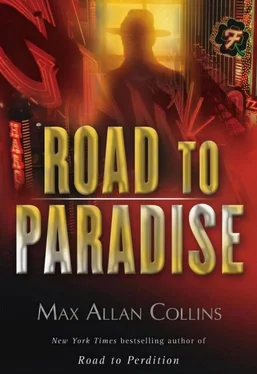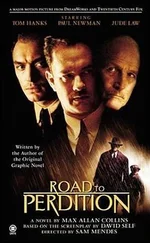“Yes, sir.”
“...Hard assignment.”
“Yes, sir. Mr. Satariano, your wife... She mistook me for your son.”
“Hell.”
“You’ve been expecting him?”
Michael nodded.
“I’m so sorry, sir. You will be receiving a telegram, with the official notification.”
Michael almost smiled. “This seems fairly official.”
“Understood, sir.”
“Do you have more information you can share?”
A curt nod. “I have a document I’m going to leave, which details the military action.”
“Have you gone over it yourself?”
“I have, sir.”
“Give it to me in your own words.”
The boy did.
Michael said, “Do you know why this took so long? This was months ago — we’re supposed to be notified in a matter of hours.”
“With a death, sir, you would be. And, in fact, your son has been designated ‘Missing in Action’ only since yesterday.”
“ Yesterday? Do you know why?”
The boy’s eyes tightened and widened, simultaneously. “Sir, I...”
“What is it?”
“The document—”
Michael sat forward so far he all but fell off the couch. “What do you know? What did you hear?”
“Sir, please...”
Michael stood. He looked down at the boy. “I was in the Pacific War, son. You don’t have to pull any punches. I was on Bataan.”
“I know. You won the Medal of Honor. I’m... Frankly, I’m in awe of you, sir. And after you served so honorably, to have to...”
“Lose my son? Why, if Mike has been declared MIA, do I sense you consider him a KIA?”
The boy’s chin jutted. “I can tell you this — you and Lieutenant Satariano may be the first father and son both to have won the Medal of Honor. His heroism is being considered in that light.”
“You heard that?”
“I did.”
“What else did you hear?”
“I’m really not at liberty to—”
“If my son were sitting where you are, Sergeant, and your father in my place? Mike would tell your dad what he wanted to know.”
The boy gave up a tiny smile — suddenly human — and said, “You’re some interrogator, Mr. Satariano.”
“I’m a sergeant, like you, son. Spill.”
The soldier had heard his CO talking on the phone to someone in Washington. The reason for the delay in classifying Michael Satariano, Jr., “Missing in Action” had to do with conflicting eyewitness accounts. An investigation and a hearing had finally resulted in Mike’s current designation.
“Apparently at least one of the men on that Huey,” the sergeant said, “claimed to have seen Lieutenant Satariano raising a handgun to... I’m sorry, sir... to his own temple as the enemy were about to swarm over him.”
Michael, pacing as he listened, stopped. “Saw this from the Huey? The departing helicopter?”
“Yes, sir.”
Michael returned to the couch, and sat, leaning back, shaking his head. “I don’t believe that, Sergeant.”
“Apparently the army’s official decision was to disregard that testimony, as well, sir. The night was dark, the helicopter was stirring up dust—”
“No. I mean, Mike’s a good Catholic boy. He would not commit suicide.”
“Oh.” The boy swallowed and sat forward. “That’s another thing, Mr. Satariano. We’re supposed to bring a minister along on these calls, but I couldn’t round up a priest in Reno, to make the trip. And there aren’t any in Crystal Bay, and I do apologize for—”
“Was there any reason, other than saving himself from captivity or torture, that my son might have taken his life?”
“I don’t understand, sir.”
“I mean, did he have any strategic knowledge — mission orders, current troop numbers, deployment information — that would have endangered his men, should it be tortured out of him?”
The soldier swallowed. “I only heard half of the conversation, Mr. Satariano. It was a phone call, remember, and—”
“Did Mike have any such info?”
Another swallow, and the boy nodded, glumly.
And Michael’s certainty that his son would never commit the sin of suicide had slipped away from him; he could well understand this sacrifice — and the hope that judgment on the other side would be tempered by mercy and understanding — coming naturally to his son.
The soldier stood, and though his hat remained in hand, he was rigidly at attention. “Sir, I hope I have not overstepped, sharing this information with you. The document I’m leaving with you contains the pertinent information, and represents the army’s, the government’s, position on your son’s status.”
Michael rose, said, “Thank you for your candor,” and ushered the boy out the front door.
The sun had gone down, and the subdivision’s blue-tinged streetlamps were glowing against a dark night — no moon, the stars doing their best against misty cloud cover.
Michael walked the young man to his car. At the curb, he put a hand on the boy’s shoulder. “Rough duty.”
The boy had tears in his eyes, and a nervous smile flashed. “Yes, sir. No fun being the angel of... Sorry, sir.”
“What were you going to say?”
“Nothing, sir.”
Michael fixed his eyes with the soldier’s. “Sergeant, have I come unglued over what you’ve told me?”
“No, sir!”
“Do I strike you as an hysterical ninny?”
“Certainly not.”
“Then tell me — what were you going to say?”
A long swallow later, he said, “That it’s... no fun being the angel of death. That’s what they call it, around the recruiting offices, where we get stuck with the job... angels of death, showing up at the doors of the families of soldiers.”
“I see.”
The boy, possibly responding to a perceived coldness in Michael, blurted, “I didn’t mean ‘stuck’ with the job, just that, well, it’s...”
Again Michael placed a hand on the young man’s shoulder; he squeezed. “I asked you to be frank, and you were. Thank you.”
They shook hands, and the soldier drove off.
How could this kid know that the phrase “angel of death” had an odd resonance for Michael? That this had been what his father, the enforcer for the Looney mob, had been called back in the ’20s and early ’30s, due to the mournful cast of his expression when he dispatched his victims? Violent death, and an angelic acceptance of it, was part of Michael’s heritage.
And his son’s.
Michael had decided not to share with his wife or daughter what the young staff sergeant told him about the military’s own indecision over Mike’s “Missing in Action” versus “Killed in Action” designation; and the weight of that had its consequence. He had been strong for Pat and for Anna, and — other than that once, with his wife — did not break down in front of them; he professed a belief in Mike returning to the fold one day, and for the first five days, he’d dealt with the burden in his own way.
He would try to go to sleep, knowing it would not happen; then he would wait for Pat to drop off into her mildly drugged slumber, and repair to his study to read a western or mystery novel, nothing overtly violent — mostly Max Brand or Agatha Christie. If he couldn’t get engrossed, he would remove his sixteen-millimeter projector from the closet, and set it up, and the little silver screen as well, and go to the shelves to select canisters of film from his collection.
He had about thirty movies — Stagecoach , various Laurel and Hardy features, Hitchcock’s Lady on a Train , a couple of the really good Abbott and Costellos, Swing Time with Fred and Ginger — the kind of movies he’d seen and loved as a kid. He had never cared for Roy Rogers or Gene Autry; singing cowboys didn’t make it for him, but he had several old westerns with Buck Jones and Tom Mix he could watch again and again.
Читать дальше











